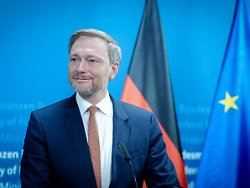Monday, December 13, 2021
Lindner moves 60 billion
Cabinet approves controversial supplementary budget
In the Corona crisis, the federal government took on 240 billion in new debts. But a quarter of the sum is not needed, so the new finance minister, Lindner, wants to put the money into an energy and climate fund. The opposition does not consider this to be constitutional.
Despite sharp criticism from the opposition, the new federal cabinet approved the supplementary budget presented by Finance Minister Christian Lindner. With the 60 billion euro budget, the traffic light coalition wants to top up the energy and climate fund. The draft law is to be discussed in the Bundestag for the first time on Thursday. Critics raise constitutional concerns about the supplementary budget.
“60 billion euros for future investments are a booster for the economy,” said Lindner after the cabinet decision. “This will enable us to sustainably cope with the economic consequences of the corona pandemic and start a powerful departure into a climate-neutral and digital future for Germany.” The supplementary budget is a “signal of our ability to act” and “an expression of the will to shape things”, emphasized Lindner in a brief statement in the Ministry of Finance. “We are securing 60 billion euros in additional investments in the future and in the creation of a climate-neutral technology nation.”
Lindner’s supplementary budget takes advantage of the fact that of the new debt of 240 billion euros planned for 2021, around 60 billion euros will probably not be needed. This sum is to flow into the energy and climate fund (EKF) in the form of a subsidy from the federal budget. The EKF, a federal special fund, was set up in 2011 to enable investments in climate protection and the energy transition beyond the federal budget.
“Scandalous and constitutionally questionable”
After the addendum, the fund will be filled with around 76.2 billion euros, said Lindner. The finance minister emphasized that no new debt would be taken on. “We only use previously unused credit authorizations in order to be able to react to the pandemic-related situation in the economy in the future as well.” It will definitely stay at 240 billion net borrowing, he assured. The federal government was only allowed to take out so many new loans this year because it made an exception to the debt brake anchored in the Basic Law with a view to the corona pandemic.
Opposition politicians complain that the reallocation of parts of these funds for the fight against climate change in the coming years is not constitutional. CSU General Secretary Markus Blume called the creation of the supplementary budget “scandalous and constitutionally questionable”. “The FDP’s promise of solid finances did not last a week,” he tweeted.
There was also criticism from the left. “The 60 billion that Christian Lindner is reallocating from Corona credit authorizations for his supplementary budget, in particular, pay small and medium incomes who have to buck the mountain of debt of the federal government. And only because the traffic light blocks a property tax for 0.7 percent of the super-rich”, wrote parliamentary group leader Dietmar Bartsch on Twitter.
Government circles, on the other hand, say that the reallocation of credit authorizations is compatible with the debt rule set out in the Basic Law. Nobody thought of a crisis like the corona pandemic when the debt rule was created.
